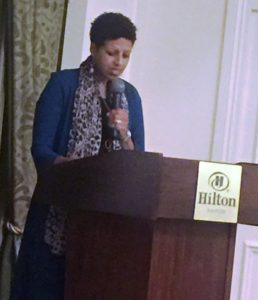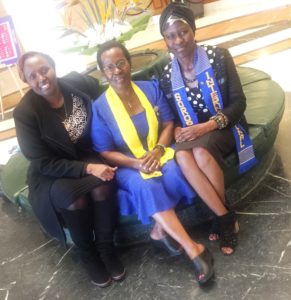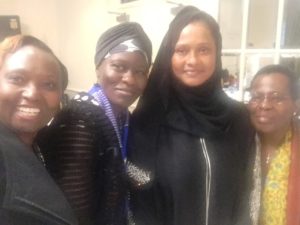A blog by Mary Muia, SI UN Representative Nairobi
“At the 62nd Session on the Commission on the Status of Women (CSW) New York, 12-23 March 2018, The head of the Government of Kenya delegation was Professor Margaret Kobia, PhD, EBS, Cabinet Secretary (CS), Ministry of Public Service, Youth and Gender Affairs. Prior to the 62nd session, the government delegation held Country preparatory meeting with relevant actors, and today’s forum can be seen as a step in the right direction, and for stakeholders to reflect on lessons learnt and draw a joint roadmap towards the implementation of the negotiated outcome resolutions.
The Government of Kenya delegation comprised of 250 delegates drawn from National & County Governments, State agencies, commissions, private sector, civil society, grassroots individuals among them three members of Soroptimist Union of Kenya (SIUK) Mary Muia, SI UN Representative (Nairobi Centre), Elizabeth Nyadwe SIE Vice President Advocacy and Dolphine Anyango Programmes Director, SI Union of Kenya.
Professor Margaret Kobia graced the review meeting, the first following the CSW 62nd session, as the Chief Guest, flagged by the UN Women Kenya Country Director Sebib Kavuma, Permanent Secretary Ministry of Public Service, Youth and Gender Affairs, Kenya Women Parliamentary Association (KEWOPA), heads of Commissions, State agencies amongst other delegates.

Photo: Zebib Kavuma, UN Women Country Director to Kenya makes her opening remarks.
In her opening remarks; the Chief Guest appreciated the support and political commitment from the highest national office, His Excellency Uhuru Kenyatta, for the continued attainment of gender equality, which is central to Kenya’s national development.
The delegation further recognized CSW as a strategic platform for Kenya to highlight key issues, share best practices and help to shape the global agenda. Delegates present praised Kenya’s visibility as a Vice Chair during CSW, and its election as Vice Chair in the 2019 CSW, the 63rd Session, as a sign that Kenya has made big strides in gender equality.
Today’s discussion underpinned the importance of engaging men and boys as agents and beneficiaries of change, and for the achievement of gender equality and empowerment of all women and girls, including those in rural areas.
The Kenya delegation to the 62nd session of Commission of Status of Women identified seven pillars as areas of priority to guide action in the empowerment of women and girls living in rural areas. Mary Muia, in her contribution on comprehensiveness on all issues affecting women and girls on identified pillars, proposed the inclusion of Women and the Environment as the seventh intervention, as one of the 12 critical areas of concern identified in the Bejing Declaration and Platform for Action, adopted by global leaders at the Fourth World Conference on Women in 1995. Drawn in joint communique below are summative priority pillars of intervention;

Photo: Mary Muia-SI UN Rep, Nairobi , Dorothy Shiroya-President SIUK, Dolphine Anyango-Programmes Director at the Kenya Delegation Post CSW 62nd Forum at Hilton Hotel Nairobi, Kenya.
a) Enhance Women Participation In Leadership And Decision Making
Agreed to sustain the advocacy for increased numbers and effective participation of women in leadershipat all levels of decision making whether in private or public and in particular the two third gender principle.
Underline the importance of strengthening the voice of rural women and girls in agency and leadership, and their full, informed, equal and effective participation at national and grassroots levels, and in decision making matters.
b) Economic Empowerment and Financial Inclusion for Women and Girls Living in Rural Areas
Equitable access to capacities, financial resources, natural resources, public contracts and markets, for example land, property rights, information communication technology, agribusiness opportunities, manufacturing, access to affordable credit and export promotion opportunities. The communique acknowledges the centrality of education, completion and transition to decent work opportunities, equal pay, and career progression to economic empowerment and participation of women and girls living in rural areas
c) Resourcing and Financing for Empowerment of Women and Girls Living in Rural Areas
Increase investment to close resource gaps for achieving gender equality of all women and girls, including women and girls living in rural areas, though, inter alia, the mobilisation of financial resources from sources, including domestic and international resource mobilisation and allocation, the full implementation of official development assistance commitments and combating illicit financial flows.

Photo: 2nd from right Ms. Asha Mohammed, Women Representative Mombasa County with the Kenyan Soroptimists delegates present at the meeting.
d) Women in Peace and Security
Women should head committees overseeing implementation of peace related programmes e.g. Nyumba Kumi (Ten Households), GBV working groups, Interclan groups, intertribal conflict resolution groups from ward level to national levels.
e) Gender Gaps, disaggregated data and tools for monitoring and evaluating progress in gender equality and women’s empowerment
Importance of accurate timely data and information, as well as clear targets, to underpin evidence-based policy and monitoring. Accelerate implementation of the Every Women Count pilot programme on gender statistics in order to support policies and actions to improve the situation of women and girls living in rural areas.
f) Elimination for Gender-Based Violence and Harmful Cultural Practices
Recognize violence against women and children remains a critical issue affecting women and girl’s empowerment. Continue efforts to end all forms of violence against women and girls, including the prevention and elimination of child marriage, early and forced marriage, female genital mutilation and other harmful traditional practices.
g) Women and Environment
Recognize the disproportionate impact of climate change on women and girls and commit to engage environment protection, in mitigation and adaptation initiatives, including disaster preparedness, response, recovery and related measures to build resilience in rural areas in Kenya”.
Lead Image: From Left: Ms. Purity Oyie, The Anti-FGM Champion Kenyan Girl who spoke on Behalf of all Girls Living in Rural Areas at the CSW 62 Session Opening ceremony in New York.

